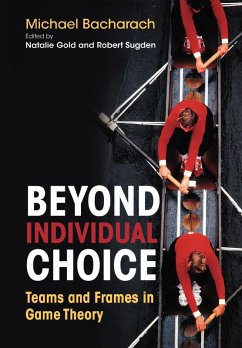Game theory is central to modern understandings of how people deal with problems of coordination and cooperation. Yet, ironically, it cannot give a straightforward explanation of some of the simplest forms of human coordination and cooperation--most famously, that people can use the apparently arbitrary features of "focal points" to solve coordination problems, and that people sometimes cooperate in "prisoner's dilemmas." Addressing a wide readership of economists, sociologists, psychologists, and philosophers, Michael Bacharach here proposes a revision of game theory that resolves these long-standing problems.
In the classical tradition of game theory, Bacharach models human beings as rational actors, but he revises the standard definition of rationality to incorporate two major new ideas. He enlarges the model of a game so that it includes the ways agents describe to themselves (or "frame") their decision problems. And he allows the possibility that people reason as members of groups (or "teams"), each taking herself to have reason to perform her component of the combination of actions that best achieves the group's common goal. Bacharach shows that certain tendencies for individuals to engage in team reasoning are consistent with recent findings in social psychology and evolutionary biology.
As the culmination of Bacharach's long-standing program of pathbreaking work on the foundations of game theory, this book has been eagerly awaited. Following Bacharach's premature death, Natalie Gold and Robert Sugden edited the unfinished work and added two substantial chapters that allow the book to be read as a coherent whole.
In the classical tradition of game theory, Bacharach models human beings as rational actors, but he revises the standard definition of rationality to incorporate two major new ideas. He enlarges the model of a game so that it includes the ways agents describe to themselves (or "frame") their decision problems. And he allows the possibility that people reason as members of groups (or "teams"), each taking herself to have reason to perform her component of the combination of actions that best achieves the group's common goal. Bacharach shows that certain tendencies for individuals to engage in team reasoning are consistent with recent findings in social psychology and evolutionary biology.
As the culmination of Bacharach's long-standing program of pathbreaking work on the foundations of game theory, this book has been eagerly awaited. Following Bacharach's premature death, Natalie Gold and Robert Sugden edited the unfinished work and added two substantial chapters that allow the book to be read as a coherent whole.
Dieser Download kann aus rechtlichen Gründen nur mit Rechnungsadresse in A, D ausgeliefert werden.









